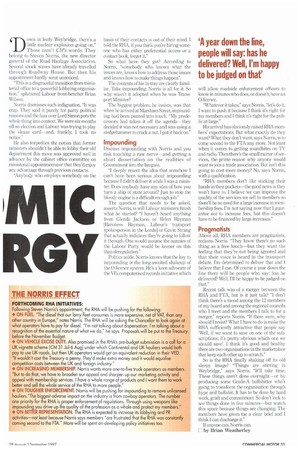4 . own in leafy Weybridge, there's a
Page 35

If you've noticed an error in this article please click here to report it so we can fix it.
little nuclear explosion going on."
Those aren't Citirs words. They belong to Steven Norris, the new director general of the Road Haulage Association. Several shock waves have already travelled through Roadway House. But then his appointment hardly went unnoticed.
"'This is a disgraceful transition from ministerial office to a powerful lobbying organisation," spluttered Labour front-bencher Brian Wilson.
Norris dismisses such indignation. "It was crap. They said it purely for party political reasons and the fuss over Lord Simon puts the whole thing into context. We were six months off an election and Labour was trying to play the sleaze card—and, frankly, I took no notice."
He also torpedoes the notion that former ministers shouldn't be able to lobby their old department (his move was approved well in advance by the cabinet office committee on ministerial appointments) or that they'd enjoy any advantage through previous contacts.
"Anybody who employs somebody on the basis of their contacts is out of their mind. I told the RHA, if you think you're hiring someone who has either preferential access or a contact book, forget it."
So what have they got? According to Norris, "somebody who knows what the issues are, knows how to address those issues and knows how to make things happen".
The contents of his in-tray are clearly familiar. Take impounding. Norris is all for it. So why wasn't it adopted when he was Transport Minister?
The biggest problem, he insists, was that when he arrived at Marsham Street, impounding had been punted into touch. "My predecessors had taken it off the agenda--they decided it was not necessary and was using a sledgehammer to crack a nut. I put it back on."
Impounding
Discuss impounding with Norris and you risk touching a raw nerve and getting a short dissertation on the realities of Government into the bargain.
"I deeply resent the idea that somehow I can't have been serious about impounding because I didn't deliver it while I was a minister. Does anybody have any idea of how you turn a ship of state around? Just to stop the bloody engine is a difficult enough job."
The question that needs to be asked, asserts Norris, is will Labour ministers finish what he started? "I haven't heard anything from Glenda Jackson or Helen Hayman [Baroness Hayman, Labour's transport spokesperson in the Lords] or Gavin Strang that actually indicates they're going to follow it through. One would assume the nannies of the Labour Party would be keener on this than deregulation."
Politics aside, Norris knows that the key to impounding is the long-awaited shakeup of the 0-licence system. He's a keen advocate of the VI's computerised records initiative which will allow roadside enforcement officers to know in minutes who does, or doesn't, have an 0-licence.
"Whatever it takes," says Norris, "let's do it. I want to push it because I think it's right for my members and I think it's right for the public at large."
His arrival has obviously raised RI-IA mem. hers' expectations. But what exactly do they want? What they don't want, says Norris, is to come second to the FTA any more. Not least when it comes to getting soundbites on TV and radio. Then there's the small matter of services, the prime reason why anyone would want to join a trade association. But isn't this going to cost more money? No, says Norris, with a qualification.
"RHA members don't like sticking their hands in their pockets—the good news is they won't have to. I believe we can improve the quality of the services we sell to members so there'll be no need for a large increase in membership fees. I'm not saying now that I guarantee not to increase fees, but this doesn't have to be financed by large increases."
Pragmatists
Above all, RHA members are pragmatists, reckons Norris. "They know there's no such thing as a free lunch—but they want the feeling that they're not being ignored and that their voice is heard in the transport debate. I'm determined to deliver that and I believe that I can. Of course a year down the line there will be people who say: has he delivered? Well. I'll be happy to be judged on that."
Recent talk was of a merger between the RHA and FTA, but is it just talk? "I don't think there's a mood among the 12 members of my board and among the regional councils who I meet and the members I talk to for a merger," reports Norris. "If there were, why should I resist? What I have to do is make the RHA sufficiently attractive that people say 'Well, if we want to save on one of the subscriptions, ifs pretty obvious which one we should save'. I think it's good and healthy there are two organisations in the marketplace that keep each other up to scratch."
So is the RHA finally shaking off its old sleepy image? "Things are stirring in Weybridge," says Norris. "It'll take time. These things aren't done overnight—or by producing some Grade-A bullshitter who's going to transform the organisation through hype and bullshit. It has to be done by hard work, graft and commitment, So don't look to see things done in five minutes—hut watch this space because things are changing. The members have given me a clear brief and I think I can discharge it."
If anyone can, Norris can.
F. by Brian Weatherley
































































































